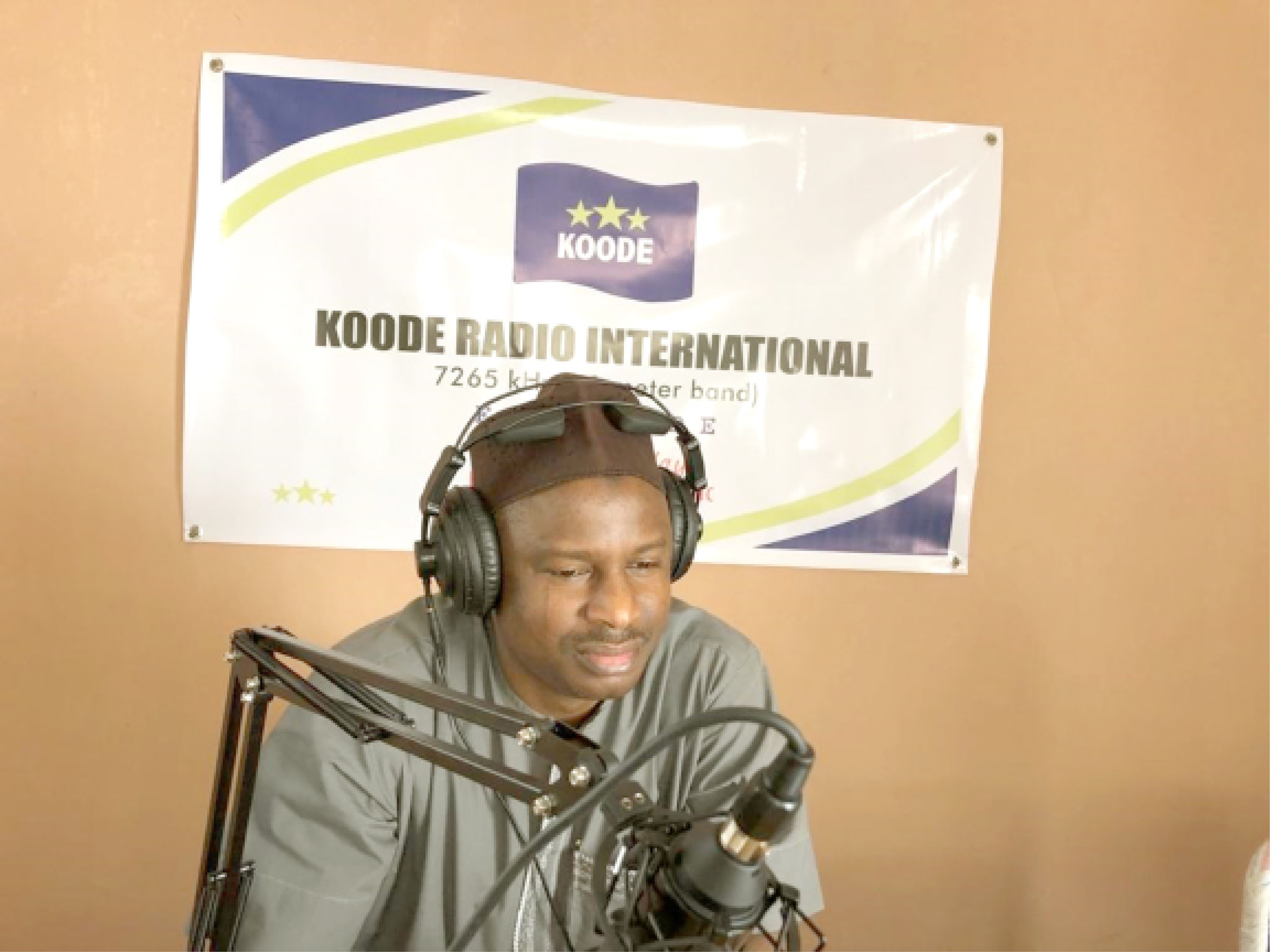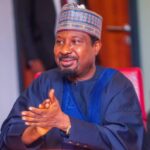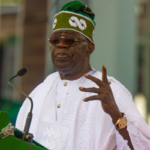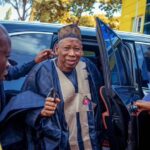Usman Shehu worked for the Voice of Nigeria (VON) and Bauchi Radio Corporation (BRC) and is now a senior editor in Duetsche Welle (DW), Germany. He is the chairman/chief executive officer of Koode Radio International (KRI) for Fulani-speaking people.
What prompted you to establish Koode Radio International?
Well, there are many reasons. The goal of Koode Radio International (KRI) is to educate, enlighten and entertain the Fulani community in all spheres. By so doing, the misunderstandings that often lead to violent clashes can be minimised while promoting ways and means through which the socio-economic and political lives of Fulbe nation can be harnessed and promoted. The repeated clashes between herders and farmers, as well as the recruitment of the Fulani into terrorist organisations will be reduced to the barest minimum. Through such constant enlightenment programmes in their own native language, this community would be easily and fully integrated into the modern way of animal husbandry, which will come with numerous advantages to the larger society. All of these are only possible if the people are properly communicated with, deeply enlightened and highly informed.
This will be the main objective and purpose of KRI.
Before these, long ago, I was angered by how Fulfulde is forgotten by national and international media. I have worked in two Nigerian media, the Voice of Nigeria and Bauchi Radio Corporation. In these media, I found that Fulfulde was just a side language.
Despite the conflict of farmers and herdsmen from Central to West Africa and the entire Sahel zone, and as a senior editor at DW Germany, I have observed that my own employer which broadcasts in 30 languages and other prominent international broadcasters like BBC, VOA, RFI, is not interested in broadcasting Fulfulde language, even though smaller languages are being broadcast in some of these media. Fulbe are known to be passionate about listening to radio. In fact, research confirmed that the Fulbe, in many parts of Africa, use a radio recorder as part of their dowry. But unfortunately, with all the attachment Fulbe have to radio, there was no single Fulfulde-oriented shortwave radio in the world before KRI.
What were the initial challenges in the venture?
Planning. That is, starting from zero; and I am working full time for my employer. It took almost every day having only three hours of sleep to prepare the content, which I needed to submit to the company which would broadcast my programme; and they need my content to get permission from the German government. After this is done, frequencies were issued and a new challenge of getting contents for airing comes in. As you might know, a medium is like a living animal; you feed a medium daily for it to survive, with no structure. I work hard to get people who can provide content. Accommodation is another challenge. I met many prominent Fulani leaders in Nigeria to get assistance to enable me have even two rooms to launch the radio, but I couldn’t get any of them to meet my request. So, I had to forget the idea of putting a studio in Nigeria since all the hope I had failed. I just decided to launch the radio online in April 2018. I was providing contents from Germany with the help of various Fulani WhatsApp groups. A friend offered me his recording studio in Abuja, and with that I launched the radio on shortwave, but in less than a week, I relocated because the studio was not fitted with live shortwave broadcast. So I moved to a boys’ quarters offered me by a friend. After about five months operating at the boys’ quarters, I was able to rent an office from where I operate now.
What are the feedbacks, especially competing with other international media organisations like the BBC and VOA?
It is positive because at the time we launched our radio, none of them is airing in Fulfulde, and to be honest, they are very supportive, even though RFI has started partial Fulfulde broadcast, but before then I was even contacted indirectly and I contributed very well in the commencement process. For VOA, it’s a place where I did my short internship at Hausa Service in Washington DC and most of the staff are colleagues and friends. Regarding the BBC, I had the opportunity to discuss with some of the management when they visited DW in Bonn, Germany, shortly after they launched Igbo and Yoruba and I raised the question of Fulfulde in their radio station.
What are the kind of programmes you air?
We have various programmes across board, including Suudu Rewbe, a women’s magazine, solemnly on ‘Gender Equality’. The main goal of the programme is to sensitise women on their rights, privileges and freedom in their daily activities at home, at work and within their communities. There is a youth programme, Maube Jango which focuses on how much we involve our youth in building and designing the future.
Filu is an empowerment programme to teach the people skills of livelihood, like food processing, international and regional trade and small enterprises. There is also Sumpo, which encourages voluntary and self-service association. We have Durgul e demal, an agriculture programme aimed at educating medium and large-scale farmers across West Africa on improved agricultural practices, skills acquisition and human development. Also, Jamu dum risku for health, Bangeeje men environment and Fina tawa, a culture programme.
Where do you have bureaus or correspondents?
We have in Garoua, Cameroon, where we produce our Sunday programme, as well as in Bamenda and Ngaoundéré, also in Cameroon, Dakar in Senegal, Maradi in Niger Republic, Conakry, Libreville and Maiduguri, Jalingo, Kebbi, Sokoto, Bauchi, Yola, Kano and Kaduna in Nigeria.
What are your immediate and long-term plans?
Our immediate plan is to foster dialogue between pastoralists and farmers. We want to use our medium to communicate to both parties directly. We are determined to counter the narrative of media towards Fulbe. With the help of pastoralist leaders we are determined to meet the few people holding arms, right in their huts, to discuss their problem and by using religious and community leaders to bring such people back to normal life and foster security in the Sahel zone. For the long-term plan, KRI has two goals, strengthening Fulfulde language and a practical training centre for online and broadcast journalists.
KRI is to be a centre of learning Fulfulde language in Africa, we are to cooperate with universities and media houses in Africa on the Fulfulde language. Like any diverse language, Fulfulde has different dialects, but if the language is spoken and written in the media, it will enhance the understanding of the different dialects. KRI has already registered and obtained a certificate as Koode Media Academy. The academy is aiming to be a centre of training for journalists in Nigeria and Africa, in collaboration with our partners in Europe.
Are you in partnership with any media organisation in terms of training for editorial and technical staff?
Presently, we have 15 partner radio stations in Africa. KRI was elected as a full member of High Frequency Coordination Conference (HFCC) at their last conference in August 2018 in Tunisia.
This has really opened our door to work with prominent shortwave radio outlet in the world. For example, the governing body of the VOA is in the process of installing shortwave monitor in our office. Similarly, the DW technical department has already installed its shortwave monitoring counter in our office. We hope the next HFCC general meeting in Buenos Aires, Argentina in August 2019, would give KRI more chances to meet other shortwave broadcast radio to learn and discuss more on their experiences in shortwave broadcasting.

 Join Daily Trust WhatsApp Community For Quick Access To News and Happenings Around You.
Join Daily Trust WhatsApp Community For Quick Access To News and Happenings Around You.


